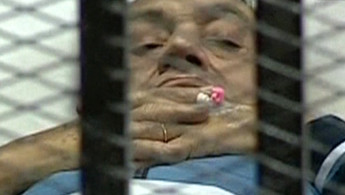Ousted former Egyptian President Mubarak freed from detention: lawyer
Two groups of security forces secured the route from the hospital to his house in the upscale district of Heliopolis, said an Egyptian security official.
The release of the 88-year old who ruled Egypt for three decades destroyed hopes that the autocrat would face justice for the deaths of hundreds who defied his rule.
Mubarak had been cleared for release earlier this month after a top court finally acquitted him of involvement in protester deaths during the 2011 revolt that ousted him.
He was accused of inciting the deaths of protesters during the 18-day revolt, in which about 850 people were killed as police clashed with demonstrators.
He was sentenced to life in jail in 2012 in the case, but an appeals court ordered a retrial, which dismissed the charges two years later.
Throughout his trial, prosecutors had been unable to provide conclusive evidence of Mubarak's complicity - a result, lawyers said, of having hastily put together the case against him in 2011 following demonstrations.
In January 2016, the appeals court upheld a three-year prison sentence for Mubarak and his two sons on corruption charges.
But the sentence took into account time served. Both of his sons, Alaa and Gamal, were freed.
He is still banned from travel pending investigations by the Illicit Gains Authority into the increase in his personal wealth since the 2011 revolution, according to his lawyer.
Activists in prison
Meanwhile, several key activists in the 2011 uprising are now serving lengthy jail terms, and rights groups say hundreds of others have been forcibly disappeared.
The anti-Mubarak revolt ushered in instability that drove away tourists and investors, taking a heavy toll on the economy and leading to nostalgia for his rule.
His successor Mohamed Morsi, an Islamist who ruled for only a year after his 2012 election, was overthrown by the military in a 2013 coup led by then defence minister and current president Abdel Fattah al-Sisi.
Twitter Post
|
Morsi's overthrow ushered in a deadly police crackdown that killed hundreds of protesters demanding his reinstatement and helped rehabilitate some Mubarak-era politicians, including a former senior member of his National Democratic Party who served as prime minister under Sisi.
Most of Mubarak's associates have been cleared in corruption trials, and police officers charged with violence during the revolt have been acquitted.
"Mubarak's trial lasted six years and public opinion became bored of it," said Mostafa Kamel al-Sayed, an analyst and political science professor in Cairo University.
Sisi and the powerful military have not fully embraced the former regime, and continue to praise the January-February revolt that brought it down.
But critics say they have limited freedoms even more than Mubarak.
In the few years before his overthrow, Mubarak had begun to loosen his grip on political life and the media, allowing for some protests and criticism.
But police abuses and economic grievances remained.
Some who participated in the protests against Mubarak said they felt the uprising was in vain.





 Follow the Middle East's top stories in English at The New Arab on Google News
Follow the Middle East's top stories in English at The New Arab on Google News
![Netanyahu furiously denounced the ICC [Getty]](/sites/default/files/styles/image_330x185/public/2024-11/GettyImages-2169352575.jpg?h=199d8c1f&itok=-vRiruf5)
![Both Hamas and the Palestinian Authority welcomed the ICC arrest warrants [Getty]](/sites/default/files/styles/image_330x185/public/2024-11/GettyImages-2178351173.jpg?h=199d8c1f&itok=TV858iVg)
